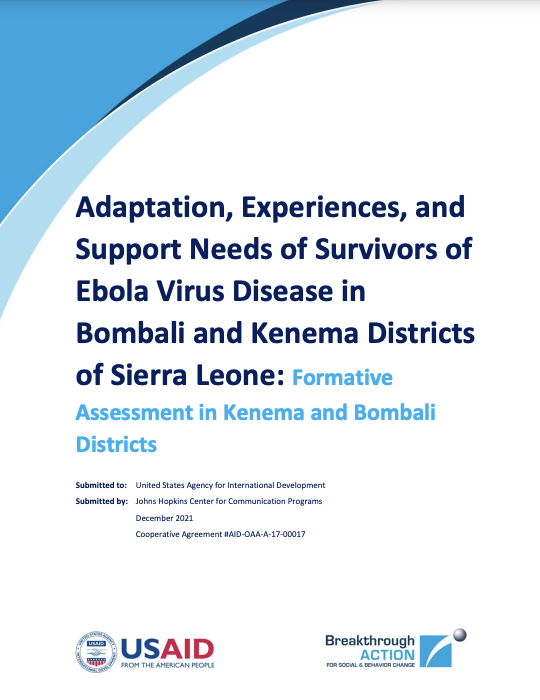Adaptation, Experiences, and Support Needs of Survivors of Ebola Virus Disease in Bombali and Kenema Districts of Sierra Leone: Formative Assessment in Kenema and Bombali Districts
After Sierra Leone’s Ebola epidemic, the Government of Sierra Leone, USAID and other partners developed and implemented the Comprehensive Program for Ebola Survivors (CPES) to support access to care and improve livelihoods for survivors of Ebola virus disease (EVD). In spite of these program priorities, EVD survivors in Sierra Leone have reported stigma and discrimination based on their survivor status and fears of transmission of the virus.
A recent outbreak of EVD in Guinea in February 2021 was found to be genetically linked to the 2014–2016 Ebola outbreak and may possibly be linked to a latent or relapsed infection linked to an EVD survivor. This potential outbreak origin was reported in local news outlets and spread through some local communities, heightening EVD survivors’ fears of increased stigma and ostracization. Breakthrough ACTION collaborated with the Sierra Leone Public Information, Risk Communication, and Social Mobilization pillar and representatives of the Sierra Leone Association of Ebola Survivors (SLAES) to support Ebola preparedness planning in Sierra Leone.
This qualitative study among EVD survivors in Sierra Leone was based on recommendations from the WHO to increase understanding of how new knowledge about the potential for long-term latent infection and transmission of EVD affects EVD survivors’ perceptions of risk, psychosocial needs, concerns around health and stigma, and relationships with others including health workers. Informal discussion groups among EVD survivors were conducted in Kenema and Bombali districts to elicit information about these themes. The study was approved by the Johns Hopkins University Institutional Review Board and the Sierra Leone Ethics and Scientific Review Council, and was a collaboration between Breakthrough ACTION, the Sierra Leone Public Information, Risk Communication, and Social Mobilization (PIRCSM) pillar, and representatives of the Sierra Leone Association of Ebola Survivors (SLAES). The results may be used to identify information gaps that can be addressed through risk communication interventions to support EVD survivors.
Source: Johns Hopkins Center for Communication Programs
Date of Publication: February 3, 2023

